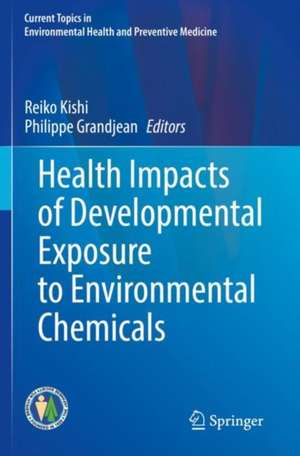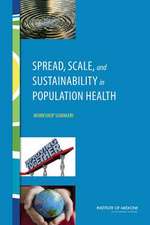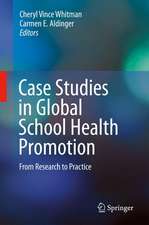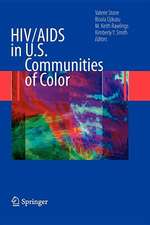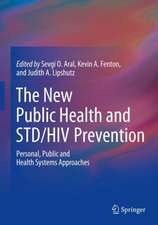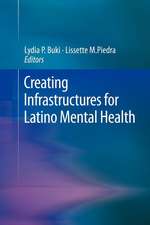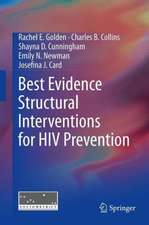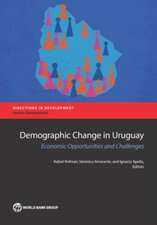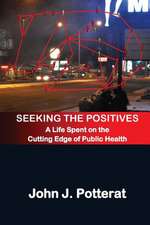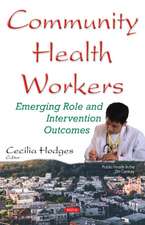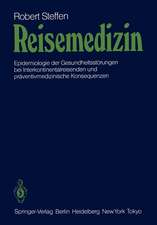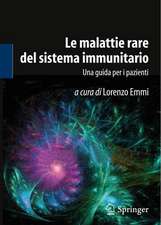Health Impacts of Developmental Exposure to Environmental Chemicals: Current Topics in Environmental Health and Preventive Medicine
Editat de Reiko Kishi, Philippe Grandjeanen Limba Engleză Paperback – 26 aug 2021
Health Impacts of Developmental Exposure to Environmental Chemicals will appeal to young and veteran researchers, students, and physicians (especially gynecologists and pediatricians) who are seeking comprehensive information on how children’s health can be affected by harmful chemicals and other environmental toxicants.
| Toate formatele și edițiile | Preț | Express |
|---|---|---|
| Paperback (1) | 737.32 lei 38-44 zile | |
| Springer Nature Singapore – 26 aug 2021 | 737.32 lei 38-44 zile | |
| Hardback (1) | 1113.99 lei 3-5 săpt. | |
| Springer Nature Singapore – 2 ian 2020 | 1113.99 lei 3-5 săpt. |
Din seria Current Topics in Environmental Health and Preventive Medicine
- 5%
 Preț: 722.48 lei
Preț: 722.48 lei - 5%
 Preț: 1032.81 lei
Preț: 1032.81 lei - 5%
 Preț: 719.10 lei
Preț: 719.10 lei - 5%
 Preț: 713.54 lei
Preț: 713.54 lei - 5%
 Preț: 1038.14 lei
Preț: 1038.14 lei - 5%
 Preț: 1036.28 lei
Preț: 1036.28 lei - 5%
 Preț: 1036.28 lei
Preț: 1036.28 lei - 5%
 Preț: 711.72 lei
Preț: 711.72 lei - 5%
 Preț: 636.11 lei
Preț: 636.11 lei - 5%
 Preț: 453.57 lei
Preț: 453.57 lei - 5%
 Preț: 645.18 lei
Preț: 645.18 lei - 5%
 Preț: 658.65 lei
Preț: 658.65 lei - 5%
 Preț: 658.37 lei
Preț: 658.37 lei - 5%
 Preț: 661.02 lei
Preț: 661.02 lei - 5%
 Preț: 642.74 lei
Preț: 642.74 lei - 5%
 Preț: 723.41 lei
Preț: 723.41 lei
Preț: 737.32 lei
Preț vechi: 776.13 lei
-5% Nou
Puncte Express: 1106
Preț estimativ în valută:
141.13€ • 153.35$ • 118.63£
141.13€ • 153.35$ • 118.63£
Carte tipărită la comandă
Livrare economică 17-23 aprilie
Preluare comenzi: 021 569.72.76
Specificații
ISBN-13: 9789811505225
ISBN-10: 9811505225
Pagini: 557
Ilustrații: XI, 557 p. 50 illus., 23 illus. in color.
Dimensiuni: 155 x 235 mm
Ediția:1st ed. 2020
Editura: Springer Nature Singapore
Colecția Springer
Seria Current Topics in Environmental Health and Preventive Medicine
Locul publicării:Singapore, Singapore
ISBN-10: 9811505225
Pagini: 557
Ilustrații: XI, 557 p. 50 illus., 23 illus. in color.
Dimensiuni: 155 x 235 mm
Ediția:1st ed. 2020
Editura: Springer Nature Singapore
Colecția Springer
Seria Current Topics in Environmental Health and Preventive Medicine
Locul publicării:Singapore, Singapore
Cuprins
Part 1 Introduction.- 1 Impacts of developmental exposure to environmental chemicals on human health with global perspectives.- Part 2 Adverse health effects on human developing organs caused by environmental chemicals-the role that chemicals might play.- 2 Environmental exposures and adverse pregnancy-related outcomes.- 3 Effects of Environmental Chemical Exposure on Birth Defects (Except Cryptorchidism and Hypospadias).- 4 Cryptorchidism and hypospadias.- 5 Endocrine-distributing chemicals and reproductive function.- 6 Thyroid hormone system and development.- 7 Neurodevelopment and Neurobehavioral disorders in relation to developmental exposures.- 8 Immunotoxicity: Impacts and research approaches.- 9 Long-Term Implications of Developmental Programming and Obesity.- Part 3 Impact of Environmental Chemical Hazards on human development.- 10 Impact of Air Pollution Hazards on Human Development.- 11 Mercury, Lead, Manganese and Hazardous Metals.- 12 Environmental Pollution and Recent Data on Asian Children’s Health in Relation to Pre- and Early Post-natal Exposure to Persistent Organic Pollutants, Including PCBs, PCDD/PCDFs, and Organochlorine Pesticides.- 13 Effects of Developmental Exposure to Perfluoroalkyl Substances on Health Outcomes in Pregnant Women and Offspring.- 14 Brominated flame retardants (BFRs).- 15 Exposure to phthalate acid esters and the its health effects.- 16 Bisphenols and alkylphenols.- Part 4 Important aspects of research for prevention and strategy.- 17 Adverse Outcome Pathways for Developmental Toxicity.- 18 Exposomics-The Exposome in Early Life.- 19 Gene-Environment Interactions to Detect Adverse Health Effects on the Next Generation.- 20 Epigenetics – Strategies for Prevention Research.- 21 From research to intervention.- Part 5 Closing.- 22 Further direction of research and policy making of environment and children's health.
Notă biografică
Reiko Kishi
Center for Environmental and Health Sciences
Hokkaido University
Sapporo
Hokkaido, Japan
Philippe Grandjean
Harvard T.H. Chan School of Public Health
Department of Environmental Health
Boston
Massachusetts, USA
University of Southern Denmark
Department of Environmental Medicine
Denmark
Center for Environmental and Health Sciences
Hokkaido University
Sapporo
Hokkaido, Japan
Philippe Grandjean
Harvard T.H. Chan School of Public Health
Department of Environmental Health
Boston
Massachusetts, USA
University of Southern Denmark
Department of Environmental Medicine
Denmark
Textul de pe ultima copertă
This book provides concise and cutting-edge studies on threats resulting from exposure to environmental chemicals that can affect human health and development, with a particular emphasis on the DOHaD concept. The book is divided into five main parts, the first of which includes an introduction to theimpacts of developmental exposure to environmental chemicals and historical perspectives, while the second focuses on how environmental chemicals can affect human organs, including neurodevelopment, immune functions, etc. In turn, the third part addresses the characteristics of specific chemicals and their effects on human health and development, while the fourth part provides a basis for future studies by highlighting the latest innovations in toxicology, remaining challenges, and promising strategies in children’s environmental health research, as well as ideas on how to bridge the gap between research evidence and practical policymaking. The fifth and last part outlines further research directions and related policymaking aspects.Health Impacts of Developmental Exposure to Environmental Chemicals will appeal to young and veteran researchers, students, and physicians (especially gynecologists and pediatricians) who are seeking comprehensive information on how children’s health can be affected by harmful chemicals and other environmental toxicants.
Caracteristici
Presents concise and cutting-edge studies on how exposure to environmental chemicals can affect human health and development, including the burgeoning DOHaD concept Provides a basis for future studies by highlighting the latest innovations in toxicology, remaining challenges, and promising strategies in children’s environmental health research Puts forward ideas on how to bridge the gap between research evidence and policymaking
